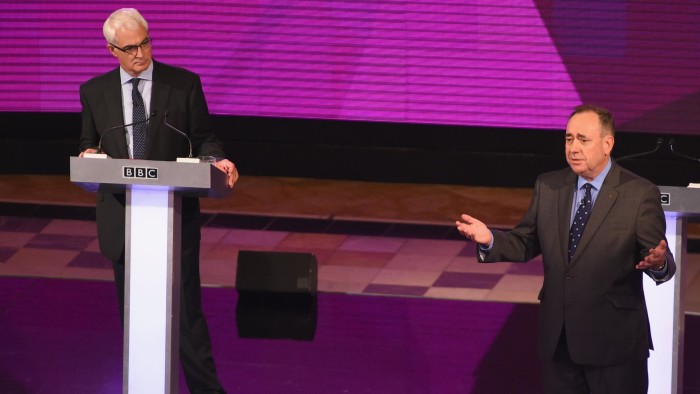Scottish independence: Yes camp can take hope from debate

Roula Khalaf, Editor of the FT, selects her favourite stories in this weekly newsletter.
Alex Salmond may have lost the first televised debate, but in the central hall of Glasgow’s lavishly refurbished Kelvingrove Art Gallery and Museum the Scottish first minister on Monday night gave new life to his independence campaign.
The fight appeared to have gone from Mr Salmond when he first confronted Alistair Darling under the television lights earlier this month, as the polls pointed inexorably to a comfortable win for the No campaign in this month’s referendum.
That might still be the outcome, but on Monday night Mr Salmond guaranteed that nationalists will enter the final leg of the independence campaign in fighting mood and still believing in an unlikely victory.
In Monday night’s BBC debate Mr Salmond was back to his best, deploying his trademark mix of bonhomie and bare-knuckle political streetcraft against Mr Darling; a snap poll suggested he won by a margin of more than 2:1.
It was so not much that Mr Salmond had new answers to Mr Darling’s persistent questioning on an independent Scotland’s currency or oil reserves, just that he delivered his replies with more conviction.
David Torrance, a political commentator and Mr Salmond’s biographer, said the first minister had prevailed against a former chancellor who was at times “fumbling” and “hesitant”.
“Salmond had it, though on a number of points it was a triumph of style over substance,” Mr Torrance said. “There were weaknesses in his case but Darling failed to capitalise.”
John Curtice of the University of Strathclyde and Scotland’s most high-profile psephologist, said: “It was a much better performance by Alex Salmond – the kind of performance we expected three weeks ago.”
However, he said Mr Darling had been able to reinforce the Better Together message that independence was the riskier option and the debate did not look likely to be in itself enough to transform the campaign.
Mr Darling drew groans from the audience as he returned repeatedly to the question of whether Mr Salmond had a “Plan B” should the rest of the UK reject his plan for a formal currency union.
In depth

Scotland will decide in a referendum to be held on September 18 whether or not to end the 307-year-old union with England
Further reading
Mr Salmond claimed his advisers on fiscal policy had produced “three Plan Bs for the price of one”: the adoption of a Scottish currency with a fixed or floating exchange rate or the unilateral “sterlingisation” adoption of the pound – but he insisted they would not be needed.
He would have a “mandate” from the Scottish people to negotiate a currency union and if the rest of the UK did not agree, he would default on Scotland’s share of the UK debt. Mr Darling snorted that “nobody would lend us any money in the future”.
The former chancellor also confirmed that Scotland could “of course use the pound” unilaterally, a statement of fact that Mr Salmond claimed was “the most important revelation” of the evening.
The first minister will hope that voters overlook Mr Darling’s assertion that sterlingisation would mean that Scotland would have no central bank, would have to run a constant surplus and could see the destruction of its financial services sector.
The two men clashed too on the likely extent of Scotland’s oil and gas reserves, while Mr Darling deplored Mr Salmond’s “scare stories” that the NHS would be increasingly privatised if Scots voted to stay part of the union on September 18.
It remains to be seen whether Mr Salmond’s debating triumph will make much of a dent in the polls: Mr Darling’s victory in the earlier encounter did not appear to significantly widen the No camp’s lead.
The FT’s tracker poll puts the No camp’s vote at about 13 percentage points and Mr Salmond badly needs a game-changer. Monday night’s debate may not be enough, but it at least offers the first minister a glimmer of hope.
Comments